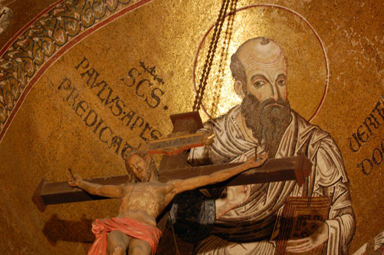John Hemer, 26/06/2017
Had Paul claimed that Jesus is Messiah because of his life and teaching, many could accept that. Had he even claimed that despite his ignominious death, Jesus was still messiah, a Jewish martyr, this too would be understandable within Jewish frames of reference. But Paul claims Jesus as messiah precisely because of the cross...
Paul originally arrived in Corinth from from Athens. There, on the Areopagus, Paul had tried to preach the Gospel in terms of Greek philosophy. It didn't work. The “wise men” laughed at his preaching. Perhaps this sharpened Paul’s proclamation, making him realise that the only way to preach something as outrageous as the cross was in bare, stark terms. Simply telling the story of the cross released a power of a very different sort from any power that eloquent human speech could have. For Jews demand signs and Greeks seek wisdom, but we preach Christ crucified, a stumbling block to Jews and folly to Gentiles, but to those who are called, both Jews and Greeks, Christ the power of God and the wisdom of God (1 Cor 1:22-24) In seeking signs (i.e. miracles) from Jesus, the Jewish people were looking for an indication that God was truly at work with him. Nothing mattered more to the Jews that this. For the Greeks, on the other hand, Wisdom was their highest value, and they were justifiably famous for it. Signs and wisdom are the basic components of religion. Paul says that the basic content of his message is nothing like the basic content of ‘normal’ religion. In fact the message of the cross doesn’t sound religious at all.
The Jews, rightly so, considered themselves to have a unique and privileged understanding of God. Ps. 19 talks first of how nature itself bears witness to God’s glory, but then goes on to declare that the Torah does the same, but even better. In other words, the two ways we can know about God are nature and religion. Paul came to realise that the cross was a much sharper lens than either of these two through which God may be truly perceived: But now the righteousness of God has been manifested apart from law, although the Law and the prophets bear witness to it (Rms 3:21). The last place, the last person, the last thing on earth that one would expect, a crucified criminal, has revealed God in a most surprising way. But on reflection, that is what the scriptures were talking about. (Here Paul offers the same insight the disciples get on the road to Emmaus in Lk 24.) Whatever credal statements have been made about God, the truest by far is that we meet him in the Crucified One: Self-giving, self-sacrificing love is the best revelation of who God is. In other words, cruciformity is the character of God.
Although the cross may seem like the obstacle to faith in Christ (“I could believe in this man only if they hadn’t crucified him”), perhaps Paul’s central claim is that God is most clearly available through the mystery of this event. So when Paul says: I decided to know nothing among you except Jesus Christ and him crucified (1 Cor. 2:2), he is not being anti-intellectual. He is saying that there is no knowledge superior to that of the crucified Christ. The cross tells us that the way in which the one true God can be known is his self-giving love. It is the great manifestation of the wisdom of God.
Reflect on some of the great theological truths of the Christian faith and try to see why the only are possible in the light of the cross.
© Fr. John Hemer, used with permission.













